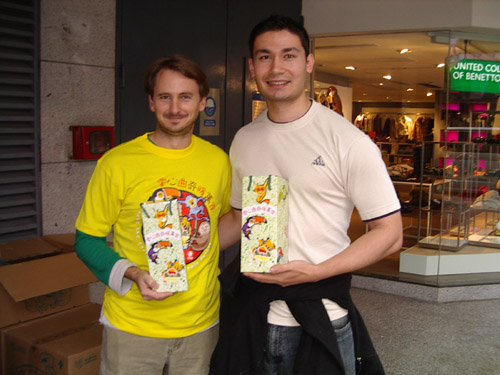Mon 26 Feb 2007
The importance of Cantonese in Hong Kong
Posted by 馬先生 under Cantonese
[17] Comments
Yesterday someone told me that I was obsessed with Cantonese, and consequently I took this comment as being quite negative and discouraging. The person thought that I would only be living in Hong Kong for a short period of time. He told me Cantonese shouldn’t be as important in comparison to English in Hong Kong. He simply couldn’t understand why I’m serious about this language. You should not take it seriously, have fun learning Cantonese. Just like the day I was told by one of my students - Hong Kong people take English seriously, Cantonese is just for fun.
Why can’t anyone understand me?
I spent 5 years at the Australian National University. I have a Bachelor of Information Technology, Bachelor of Commerce, and Master of Commerce. I’ve worked in the IT industry for 6 years being a Test Analyst and Business Analyst for which I studied and worked both full-time.
Lets talk about my situation today in Hong Kong. I have zero experience in commercial banking, financial consulting or the derivatives market, but locals keep telling me to apply because I can speak fluent English. My wife and I would like to start a family soon and purchase a shoe-box. God will not provide and I must financially support them. Going back to a graduate or junior position in a totally new industry isn’t viable. There is no way I can support a family on the income a graduate earns. I didn’t study 5 years in University to be an English teacher either. Some give their words of wisdom and suggest to go back to Australia. This kind of makes me upset, as people fail to realise that my wife is a local Hong Kong person and university graduate. She is currently working and I think its ridiculous to ask her to quit her job so that I can find a job in Australia. Especially when we’ve decided to settle down in Hong Kong for a very long time.
Every position in Hong Kong that is suitable for my experience and knowledge requires either Cantonese only, English/Cantonese or English/Cantonese/Mandarin. So many people tell me, there are so many white guys 鬼佬 gwai2 lou2 in Hong Kong, how come they get jobs and I can’t? One of the main reasons I can think of is because they are expatriates who directly get employed by their home country’s office. In addition, I don’t feel its appropriate to group a whole group as “foreigners”, and ignoring factors like individual experience, aptitude or education.
So why do I study Cantonese for endless hours per day?
No pain, no gain. Right? I applied for a position that made no mention of language requirements. I was asked at the interview if I could speak Cantonese. The interviewer told me that this is Hong Kong, the local market is Cantonese, and not all the employees can communicate strongly in English. Especially when multi-millions of dollars are spent on projects, accuracy is quite important and one can not rely on dictionaries and guesses.
I have met people who have lived in Hong Kong much longer than me but still can’t have a 30 second conversation with me. They speak English at home, speak English on the streets, watch Pearl and surround themselves with English speaking friends. Then they wonder why I can manage to communicate with people in Cantonese.
I have a basic rule: It’s Cantonese or nothing. I don’t care if its convenient to use English because you studied for 20+ years. I’m not going to end up like those lazy expats who speak English everyday for 5-6 years in Hong Kong and suddenly wake up by learning some Chinese. They then choose Mandarin because its China’s official language.
I might appear to be rude, selfish or inconsiderate. However, I am doing whatever it takes to achieve advanced Cantonese fluency.
My wife does not speak English to me, even though she speaks English extremely fluently. If I’m going to wear the pants in the family, I’m going to have to master Cantonese.























